Forex investing (2024): how can you start trading Forex?
The largest financial market on earth is the Forex or currency market. The Forex market allows you to speculate on rising and falling exchange rates. But how exactly does currency trading work and what factors influence the exchange rates? In this complete Forex guide you will learn everything you need to know to start investing on the Forex market.
What will you learn in this guide?
- Exchange rates: how do exchange rates work?
- Trading in Forex: how can you invest in currencies?
- Predicting the rate: how can you predict the exchange rate?
- Base & quote currency: what are they and how to use them?
- Types of currencies: which currencies can you trade in?
- Trading in practice: how does Forex trading work?
- Forex terms: important Forex terms are explained.
- Price movements: why and how do prices move?
- Brokers: which brokers are active on the Forex market?
- Dollar: why is the dollar so important?
- Some tips and pointers for trading in Forex
The exchange rate & Forex trading
The exchange rate is essential when you start trading in Forex. The exchange rate indicates the value of one currency in relation to another. When trading in currencies, you usually trade in several currencies concurrently. When you invest in the euro/dollar, you are investing in the value of the euro against the dollar.
If the price of the euro against the dollar is 1.10 then you can buy 1.1 dollars for 1 euro.
How can you start trading Forex?
Globally, many people speculate on different currency pairs. There are always two options when you invest in currencies. You can either buy a currency pair or short sell a currency pair. When you trade in EUR/USD you would have two options:
- When you buy, you are betting on a rise in the euro against the dollar.
- When you short you are betting on a fall in the euro against the dollar.
Because you can bet on both rising and falling prices, you can make a profitable trade in any market. In order to achieve a positive result you will have to predict the future market developments. But where can you actually start trading Forex as a beginner?
You can trade Forex by opening an account with an online broker. It is important to select a low-cost broker. When you choose an expensive broker, you spend an unnecessary amount of money on transaction fees, thus subtracting from any gains you make. Do you want to know at which broker you can trade Forex? In our comparison you can discover which brokers are best suited for trading Forex:
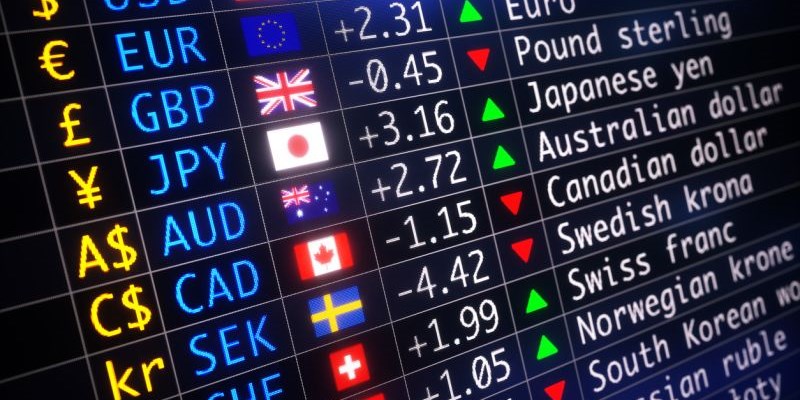
How can you predict changes in the market?
If you want to trade successfully in currency pairs such as EUR/USD, GBP/USD and AUD/USD, you need to be able to predict price changes. You should always try to determine whether one currency is overvalued or undervalued against the other currency. When a currency is undervalued you buy and when it is overvalued you go short.
Using a variety of analyses you can determine whether a given currency’s price will fall or rise. The most common analyses are:
- Technical analysis: viewing and predicting patterns using graphical analysis.
- Fundamental analysis: predicting the change in a given currency using economic analysis.
What are the base & the quote currency?
When you trade in Forex, you always have to deal with a base and a quote currency. At EUR/USD, the euro is the base currency and the dollar is the quoted currency.
- The base currency is the currency you buy when you trade in the currency pair.
- The currency quote is the currency you sell when you trade in the currency pair.
The pair EUR/USD thus indicates how many dollars you get for a euro. There are three different situations that can occur in any currency pair:
- 0.9 EUR/USD: this means that one euro is worth 0.90 dollars.
- 1 EUR/USD: this means that one euro is worth one dollar.
- 1.1 EUR/USD: this means that one euro is worth one dollar and 10 cents.
When you think the base currency is getting stronger, you buy the pair (long) and when you think the quote currency is getting stronger, you sell the pair (short).
What categories of currency pairs exist?
For many brokers, the currency pairs are divided into the following categories:
- Major pairs: seven currencies responsible for 80% of global Forex trading: EUR/USD, USD/JPY, GBP/USD, USD/CHF, USD/CAD and AUD/USD.
- Minor pairs: less often traded. Often major currencies without the dollar. Examples are EUR/CHF and GBP/JPY.
- Exotic pairs: from emerging or small countries. Examples are the Polish zloty and the Mexican peso.
How does forex trading work in practice?
You can trade forex using all kinds of derivatives. However, the starting point behind forex trading is always the same. You buy one currency and you sell another currency. This allows you to benefit from the difference in value between the currency pairs.
With a broker, the results you achieve are automatically tracked. It is always wise to try your hand at Forex investing using a free broker trial. With the button below, you can open a free demo account immediately:
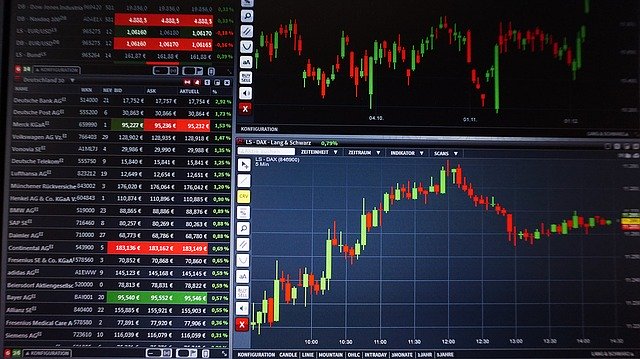
Investing in Forex: Important Terms
When you start trading in Forex, it is imperative you gain an understanding of the terms below.
What is a lot at Forex?
Currencies are traded in fixed sizes. When you trade Forex we call these fixed amounts lots. A standard lot has a size of 100,000 units of the basic currency. Most CFD brokers also allow you to trade in mini (10,000 units) and micro (1,000 units) lots.
What is a pip?
Pips are used to display changes in the price of a currency. If the price moves from EUR/USD 1.0000 to 1.0001, there is an increase of one pip. For some brokers, the price is also tracked to the fifth number after the comma: these changes are called pipettes.
In some currency pairs, pips work slightly differently. This is the case with currencies that are recorded with fewer numbers after the comma. This is the case with the Japanese Yen. With the Japanese Yen, the second number after the comma is a pip.
What is leverage?
With many brokers, you have the option to apply leverage to your trades. A leverage makes it possible to open a bigger trading position with a smaller amount of money. The maximum leverage for many brokers is 1:30. With an investment of $10,000 you can then trade with $300,000. But how does leveraging affect your potential return with a 1 percent increase?
- Without leverage, your profit is 1%.
- With 1:30 leverage, your profit is 30%.
However, when you use leverage, you also stand to lose more if the market moves in the opposite direction:
- Without leverage, your loss is 1%.
- With 1:30 leverage, your loss is 30%.
A leverage makes it possible to achieve a high return in a short period of time. At the same time, you have to be careful. You can also quickly lose your entire deposit with a leverage.
How does the margin work?
When you put a lever on your Forex investment, you are trading by a margin. The margin indicates how much money you need in your account to open your position. With a leverage of 1:30, you only need $3,300 in your account to trade with an investment of $100,000.
You should always have enough money in your account to maintain your open positions. If you no longer have enough money in your account, you may face a margin call. When you face a margin call, you can lose the full amount in your investment account.
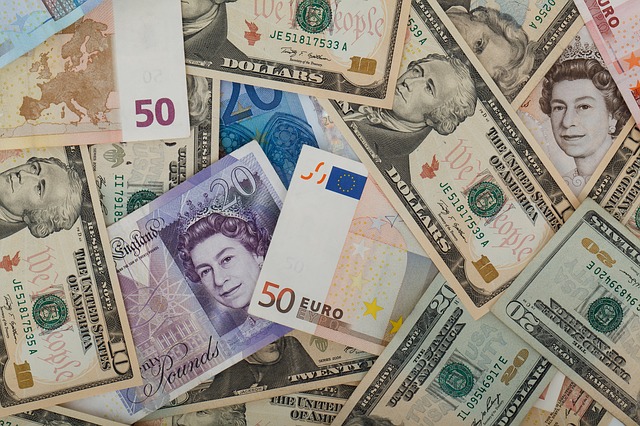
Why do prices move?
When you want to invest successfully in Forex, you need to understand why the prices are moving and what drives these changes. There are several reasons why the exchange rate of one currency can change against another currency. In this section we will discuss the main causes of currency price fluctuations.
Inflation (-)
Inflation has a strong impact on the value of a local currency. If inflation rises faster within a country than within other countries, the currency of the country with higher inflation will become less valuable. When this happens within Europe, the buying power of the euro falls. The value of the euro against the dollar then decreases and the price falls.
Interest (+)
Interest rates also have a strong influence on the exchange rate. If the central bank has a relatively higher interest rate, the value of the currency will increase. After all, people are more in demand for a currency that yields a higher return. Banks can adjust interest rates to ensure that a currency does not become too expensive or cheap in relation to other currencies.
Speeches by the chairmen of central banks often cause volatility in the currency market. Day traders can benefit from the price movements that coincide with interest rate decisions.
The need for investing (+)
A strong economy will often boost a currency’s value. This happens, for example, when there is a high demand for investments. Foreign companies will then exchange money to invest in the country in question. Due to the increased interest, the exchange rate will rise.
Confidence (+)
Money revolves around trust. The only reason we value an otherwise worthless piece of paper is because we have faith in the institution behind it. When this confidence rises, the exchange rate of the currency increases. Are we losing confidence? Then the exchange rate can collapse quickly.
Fleeing capital (-)
In some countries the economy is not performing well. When this happens people often exchange their money for other currencies. In many African countries inhabitants prefer the dollar over their local currency. When the trust in the local economy is low and people exchange their money in other currencies, the local currency falls considerably.
Devaluation (-)
A cheap currency can be beneficial for a country’s economy. After all, when the currency is cheap, foreign companies can purchase products and services for less money. Governments can therefore choose to intentionally devalue a currency. Devaluation can be achieved by lowering the interest rates.
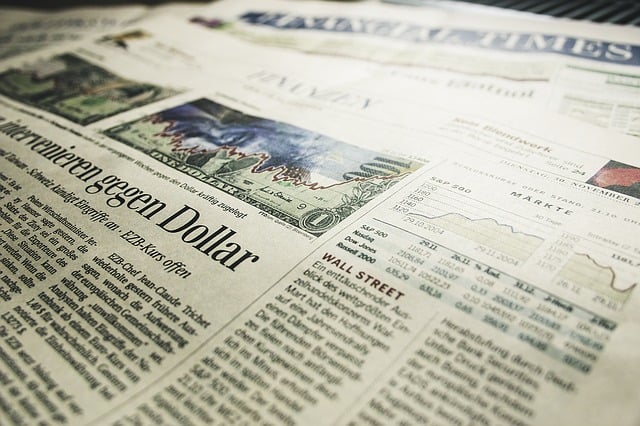
Which institutions buy and sell currencies?
Before you trade in Forex, it is wise to remember that there are many entities constantly buying and selling currencies. The value of a currency such as the dollar is dictated by supply and demand. When you can understand and predict the actions of a large group of people, you will be better able to predict the future exchange rate.
Investors in shares
When you invest in U.S. stocks you need dollars first. Before you can buy an American share you will first have to exchange your local currency for dollars. All stock trading combined will affect the exchange rate of a currency.
Speculators
Speculators are individuals and organizations that try to take advantage of the many daily currency fluctuations of currency pairs. When many speculators buy or sell a currency, this can affect the exchange rate.
Entrepreneurs
Multinationals do business in different regions. When they buy or sell products and services in other countries they have to exchange currencies. The demand for products from a given region can therefore significantly influence the demand of a particular region’s currency.
Central banks
Central banks often try to influence the value of currencies. They can do this by printing more money. When a central bank prints more money the supply increases which can lower the currency rate. However, central banks can never influence the entire exchange rate: the Forex market is simply too big for that.
Which institutions should you look out for when trading Forex?
When you invest in Forex, there are several institutions that you should keep a close eye on. Below we discuss the main parties that are active on the Forex market.
The news
The news can affect the price of a currency. When positive news emerges about a region, it can affect the price of the currency used there. Therefore, always think carefully about how the news will affect both the supply of and demand for a given currency.
Market sentiment
Sometimes there may be a self-fulfilling prophecy. If the majority in the market believes that a particular development will take place, it will likely come true. If the majority believes that the euro’s value will increase, people will continue to buy the euro until this price level is reached. It is therefore wise to keep an eye on the general sentiment within the market surrounding currencies.
Economic data
Economic data tells you how the economy is performing. For example, you can keep an eye on inflation. When inflation within the euro area rises above 2%, the ECB usually raises interest rates. With higher interest rates, the currency becomes more attractive, which presents an opportunity to make a frugal investment.
Credit rating
Investors want to know if it's wise to lend money to a country. Several agencies therefore give countries a credit rating. The credit rating indicates how likely it is that a country can meet its debts. If the credit assessment develops positively, it can increase the currency rate behind it. Trust plays an important role in the financial markets.
Central banks
The availability of a currency is determined by the central bank. After the economic crisis, for example, you saw central banks doing quantitative easing. They then print more money, which can fuel spending within the country. If supply increases in the case of equal demand, the price of the currency will decrease.
Why is the dollar so important?
When you start trading Forex you might notice that the dollar is often seen as the dominant currency. This is partly because the economy of the United States is the largest of the world. It is an open economy that many parties can participate in. When the value of the dollar decreases, it can reduce profits for companies around the world.
The dollar is widely used for trading and investing. Many stocks, but also commodities such as gold and silver are listed in dollars. Some countries have even linked the exchange rate of their currency to the dollar.
In the end the dollar is more than a currency. The dollar is the glue that holds the entire system together. Increases and falls on the dollar have a strong impact on the global markets.
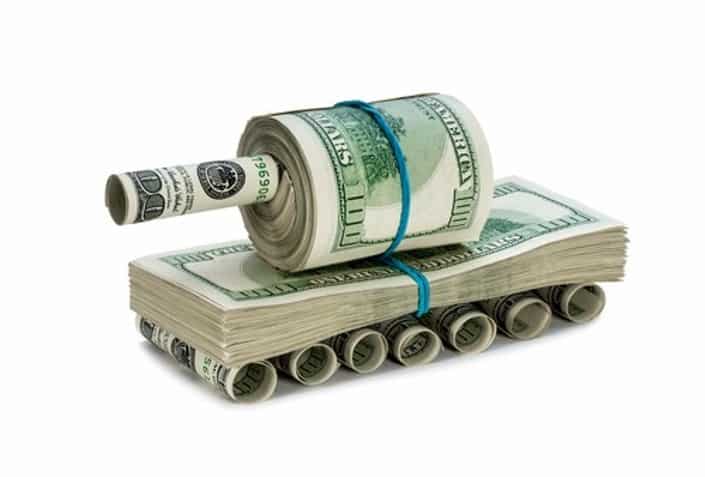
Trading in Forex tips
When you start speculating on the Forex market, you must take some tips in to account. Firstly, use a stop loss. With a stop loss, you make sure you don't lose more than a determined percentage of your position. By doing so, you can protect yourself against unexpected events.
Forex price patters are often more predictable than the price patterns of stocks. Forex patterns are easier to spot and the movements are often less extreme. Forex can therefore be very lucrative for day traders. However, it is important to practice before you start working with large amounts of money. Many brokers allow you to try out the possibilities for free with a demo.
Finally, it is wise to manage your risk and return well. If an investment in a currency pair can yield $100 but has a risk of $1000 then you should look for a better opportunity. Look for trading opportunities where you have a chance of a high potential gain and a low potential loss.
